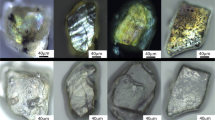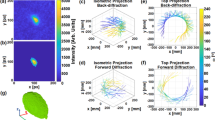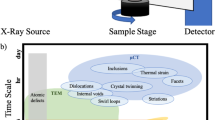Abstract
LAST summer one of us was able, through the courtesy of the General Electric Co., of Schenectady, New York, to select a few of the diamonds made in the Company's Research Laboratories and to bring them to University College, London, for detailed X-ray examinations. These diamonds are mostly very small (less than ½mm. linear) and are coloured (yellow, green, black) and good shapes are rare. Although some colourless diamonds have been made, there were none among our collection, nor did we have any of those of pure cubic form. The habits, which are exceedingly interesting, will be discussed in the more extended account of this work to be published later.
This is a preview of subscription content, access via your institution
Access options
Subscribe to this journal
Receive 51 print issues and online access
$199.00 per year
only $3.90 per issue
Buy this article
- Purchase on Springer Link
- Instant access to full article PDF
Prices may be subject to local taxes which are calculated during checkout
Similar content being viewed by others
References
Bernier, R., Ann. Chim., 6, 104 (1951); distances given here as in A. are really in kX., and must be multiplied by 1.00202.
Nath, N. S. N., Proc. Ind. Acad. Sci., A, 1, 841 (1935).
Grenville-Wells, H. J., Thesis, London (1951).
Author information
Authors and Affiliations
Rights and permissions
About this article
Cite this article
JUDITH GRENVILLE-WELLS, H., LONSDALE, K. X-Ray Study of Laboratory-made Diamonds. Nature 181, 758–759 (1958). https://doi.org/10.1038/181758a0
Issue Date:
DOI: https://doi.org/10.1038/181758a0
This article is cited by
-
Misfit accommodation mechanism at the heterointerface between diamond and cubic boron nitride
Nature Communications (2015)
-
Structural changes in second-order phase transitions in diamond-type crystals
Soviet Physics Journal (1978)
-
Synthesis and X-Ray Analysis of Diamond
Nature (1961)
Comments
By submitting a comment you agree to abide by our Terms and Community Guidelines. If you find something abusive or that does not comply with our terms or guidelines please flag it as inappropriate.



